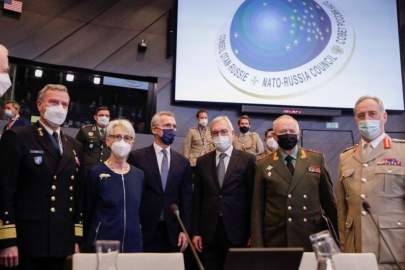Russia Says Ukraine Talks Hit 'Dead End', Poland Warns of Risk of War

VIENNA/MOSCOW (Reuters) - Poland's foreign minister said on Thursday that Europe was closer to war than any time in the last 30 years as Russia gave a bleak assessment of diplomatic efforts this week to defuse tensions over Ukraine.
Russia said it was hitting a dead end as it tried to persuade the West to bar Ukraine from joining NATO and roll back decades of alliance expansion in Europe.
It offered a stark view before the week's security meetings have even finished, with talks under way in Vienna on Thursday at the 57-nation Organization for Security and Cooperation in Europe (OSCE).
Without naming Russia in his address to envoys from the 57 OSCE members, Polish Foreign Minister Zbigniew Rau mentioned tensions in Ukraine, Georgia, Armenia and Moldova, all countries with active or frozen conflicts in which Russia has been alleged to be a party.
"It seems that the risk of war in the OSCE area is now greater than ever before in the last 30 years," he said.
"For several weeks we have been faced with the prospect of a major military escalation in Eastern Europe," he said, launching his country's year-long chairmanship of the region's largest security organisation.
He reported no breakthrough at the meeting.
Deputy Foreign Minister Sergei Ryabkov told RTVI television in an interview that Russian military specialists were providing options to President Vladimir Putin in case the situation around Ukraine worsened, but diplomacy must be given a chance.
However, he said talks with the United States in Geneva on Monday and with NATO in Brussels on Wednesday had shown there was a "dead end or difference of approaches", and he saw no reason to sit down again in the coming days to re-start the same discussions.
The U.S. envoy to the OSCE talks said the West should not give in to blackmail.
Russia has forced the United States and its allies to the negotiating table by assembling around 100,000 troops near the border with Ukraine, while denying it plans to invade. Foreign Minister Sergei Lavrov said U.S. demands for them to pull back were unacceptable.
Ukrainian Foreign Minister Dmytro Kuleba said: "Despite the unsatisfactory week of great diplomacy for Russia, I believe that the only way for the Russians to confirm their lack of intention to solve problems by force is to continue the discussion in the established formats, in particular in the OSCE."
'ELIMINATE THREATS'
The barrage of pessimistic comment from Russian ministers and officials cast grave doubt on the chances of a diplomatic breakthrough at one of the most fraught moments in East-West relations since the Cold War.
Russian Ambassador Alexander Lukashevich told the OSCE: "If we don't hear a constructive response to our proposals within a reasonable timeframe and an aggressive line of behaviour towards Russia continues, we will be forced to draw appropriate conclusions and take all necessary measures to ensure strategic balance and eliminate unacceptable threats to our national security."
He went on: "Russia is a peace-loving country. But we do not need peace at any cost. The need to obtain these legally formalised security guarantees for us is unconditional."
His speech was consistent with a pattern of recent statements in which Russia has said it wants a diplomatic solution but has also rejected calls to reverse its troop build-up and warned of unspecified consequences for Western security if its demands go unheeded.
The United States says Moscow's calls to veto Ukrainian membership and halt NATO military activity in eastern Europe are non-starters, but that it is willing to talk about arms control, missile deployments and confidence-building measures.
Russia says that after decades of NATO expansion it is determined to draw red lines and stop the alliance from admitting Ukraine as a member or basing missiles there.
NATO Secretary General Jens Stoltenberg said after talks with Russia on Wednesday that countries must be free to choose their own security arrangements.
Kremlin spokesman Dmitry Peskov criticised a sanctions bill unveiled by U.S. Senate Democrats on Wednesday that would target top Russian government and military officials, including Putin, as well as key banking institutions, if Russia attacks Ukraine.
Peskov said sanctioning Putin would be tantamount to severing relations.
"We view the appearance of such documents and statements extremely negatively against the background of an ongoing series of negotiations, albeit unsuccessful ones," he said.
U.S. ambassador Michael Carpenter told the OSCE meeting: "As we prepare for an open dialogue on how to strengthen security for the benefit of all, we must decisively reject blackmail and never allow aggression and threats to be rewarded."
Russia has said it will decide on its next moves after this week's talks. It has threatened unspecified "military -technical measures" if its demands are rejected.
U.S. Deputy Secretary of State Wendy Sherman said on Wednesday that if Russia walked away, it would show it was never serious about diplomacy in the first place.
(Additional reporting by Francois Murphy, Tom Balmforth, Polina Devitt and Alexander Marrow; Writing by Mark Trevelyan; Editing by Philippa Fletcher and Frances Kerry)




